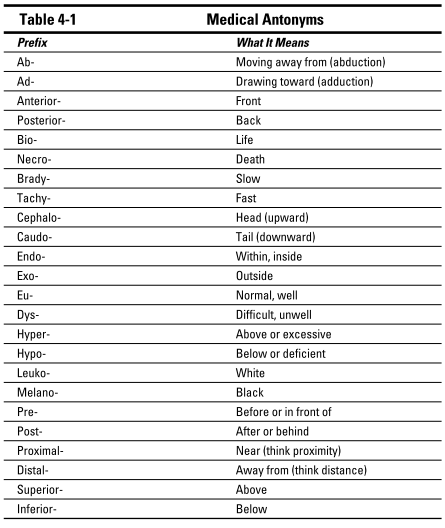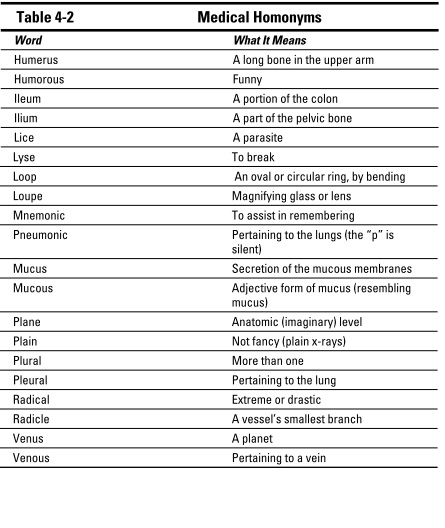α Α alpha
ω Ω omega
β Β beta
ο Ο omicron
χ Χ chi
φ Φ phi
δ Δ delta (diagnosis; change)
π Π pi
ε Ε epsilon
ψ Ψ psi
η Η eta
ρ Ρ rho
γ Γ gamma
σ Σ sigma
ι Ι iota
τ Τ tau
κ Κ kappa
θ Θ theta
lambda; Λ lambda
υ Υ upsilon
μ Μ mu
ξ Ξ xi
ν Ν nu
ζ Ζ zeta
Acronyms and abbreviations are used extensively in medicine, science and technology for good reason - they are more essential in such fields. It would be difficult to imagine how one could write down chemical and mathematical formulas and equations without using abbreviations or symbols.
Sprechen Sie terminology?
Medical terminology is like a foreign language to most people. In fact, it operates exactly like a foreign language if you have never encountered it before. There are so many words that are difficult to pronounce and even more difficult to spell correctly. As such, medical terms sound strange, confusing, and sometimes overwhelming to the novice. They make no sense whatsoever. But as in a foreign country, you can't make out what is happening until you can speak the language.
Just as with practicing German (or any language, for that matter), you get the meaning of medical terms by breaking down each word into different parts:
- Prefix: Appears at the beginning of a word and tells the how, why, where, when, how much, how many, position, direction, time, or status.
- Root word: Specifies the body part to which the term refers.
- Suffix: Appears at the end of a word and indicates a procedure, condition, or disease
Those are the bare bones, basic parts of every medical term. Each prefix, root, and suffix has its own meaning, so it's your job to remember them and put the three meanings together into one greater word meaning. It can be tricky, though, so proceed carefully until you are confident of individual part meanings.
As with languages, things aren't always what they seem. For example, if we use tonsillitis and appendectomy, we see that the suffix -itis always means "inflammation," no matter what root word precedes it. Similarly, the suffix -ectomy always means "surgical removal of."
So when switching suffixes, appendicitis means "inflammation of the appendix," and tonsillectomy means "surgical removal of the tonsils."
Abbreviations and acronyms used in medicine can be grouped into two broad categories. The first consists of official abbreviations and symbols used in chemistry, mathematics, and other sciences, and those designating weights and measures, whose exact form, capitalization, and punctuation have been determined by official governing bodies. In this category, they mean only one thing (e.g., kg is the symbol for kilogram and Hz for hertz), and their form, capitalization, and punctuation have been established by the International System of Units (Systeme International d'Unites). Abbreviations in the second group, on the other hand, may appear in a variety of forms, the same abbreviation having a different number of letters, sometimes capitalized, at other times not, with or without punctuation. Moreover, they may also have numerous meanings. The abbreviation AP may mean alkaline phosphatase, acid phosphatase, action potential, angina pectoris, and many other things.
Acronyms
An acronym is a word (or abbreviation) formed by the first letters or syllables of other words. Most acronyms are expressed in uppercase letters, but not always. For example, you might be familiar with the words scuba and laser.
These terms are so well known that they have become acceptable as words in their own right. Scuba began life as an acronym for self-contained underwater breathing apparatus. Laser was an acronym for light amplification by stimulated emission of radiation. These two humble acronyms went on to greater glory as bona fide words.
There are, to put it mildly, many acronyms in medical terminology, some of which are common, some not so common. It is important to know the context in which they are used, because many are identical or sound similar, but have quite different meanings. Here are some common medical acronyms.
- AMA: American Medical Association
- AMA: Against medical advice
- CAT: Computerized axial tomography (scan)
- CAT: Children's apperception test
- COPD: Chronic obstructive pulmonary disease
- COPE: Chronic obstructive pulmonary emphysema
- ECT: Electroconvulsive therapy (shock therapy)
- ECT: Enteric-coated tablet
- ECT: Euglobulin clot test
- MRI: Magnetic resonance imaging
- MRI: Medical Research Institute
- MRI: Medical records information
As you can see, many acronyms look the same, but actually mean something different. Knowing the context in which an acronym is being used is very important. Many common acronyms can be misinterpreted.
 A favorite acronym of many medical professionals is BM. If you have ever been a patient in hospital, the usual question always asked by the nurse is, "Have you had a BM today?"
A favorite acronym of many medical professionals is BM. If you have ever been a patient in hospital, the usual question always asked by the nurse is, "Have you had a BM today?"
Of course, most people know the nurse is referring to a bowel movement, but BM also could mean basal metabolism, body mass, bone marrow, basement membrane, blood monocyte, breast milk, or Bachelor of Medicine. Face it - everyone loves a good BM joke.
Next on the tour of plural forms is the antonym, proving once and for all that opposites do attract. An antonym is a word that means the opposite of another word. Examples would be right/wrong, right/left, up/down, and front/back. With reference to medical terms, some prefixes can be paired as opposites. Table 4-1 lists some of the most popular.
Eponyms
Eponyms are an unusual and interesting facet of the plural world. An eponym is a person, place, or thing from which a person, place, or thing, gets (or is reputed to get) its name. For example, Romulus is the eponym of Rome. It can also refer to a person whose name is a synonym for something (from the Greek eponymos: epi [to] + onyma [name]).
In the medical field a disease, sign, operation, surgical instrument, syndrome, or test is often named after a certain physician, surgeon, scientist, or researcher - someone responsible for the creation, improvement, or research involved in its discovery.
In current usage, it is now acceptable to drop the possessive apostrophe from most eponyms, so either is acceptable. For example, you can use Alzheimer's or Alzheimer.
Here are some of the most popular medical eponyms:
- Apgar score: Named after Virginia Apgar, American anesthesiologist (1909 - 1974). A numbering expressing the condition of a newborn infant at 1 minute of age and again at 5 minutes.
- Alzheimer's disease: Named for Alois Alzheimer, a German neurologist (1864 - 1915). A progressive degenerative disease of the brain.
- Cushing's syndrome: Named for Harvey Williams Cushing, American surgeon (1869 - 1939). A complex of symptoms caused by hyperactivity of the adrenal cortex.
- Down syndrome: Named after John Haydon Down, English physician (1828 - 1896). A chromosomal disorder, also called trisomy 21, formerly called mongolism.
- Gleason grade: Named for Donald Gleason, American pathologist (1920 - Present). A rating of prostate cancer assigning scores of 1 - 5 for degrees of primary and secondary growth.
- Hodgkin's disease: A form of malignant lymphoma. Named for Thomas Hodgkin, an English physician (1798 - 1866).
- Homans' sign: Named for John Homans, American surgeon (1877 - 1954). Pain on dorsiflexion of the foot; a sign of thrombosis of deep veins of the calf.
- Ligament of Treitz: Located in the intestinal tract. Named after Wenzel Treitz, a Czech physician (1819 - 1872).
- Lyme disease: A multisystemic disorder transmitted by ticks. Named after a place, Old Lyme, Connecticut, where the disease was first reported in 1975.
- Peyronie's disease: Named for Francois de la Peyronie, a French surgeon (1678 - 1747). It means a deformity or curvature of the penis caused by fibrous tissue within the tunica albuginea. When distortion of the penis is severe it causes erectile dysfunction or severe pain during intercourse.
- Parkinson's disease: Named for James Parkinson, English physician (1755 - 1824). A group of neurological disorders including tremors and muscular rigidity.
As you can see, most of those famous people are no longer with us. So you had a much better chance of having something named after you if you were born a hundred years ago.
Don't be afraid to learn more about eponyms. Many diseases, signs, syndromes, and tests are listed in a medical dictionary. Any name can be researched as most are cross-indexed in a good medical dictionary such as Dorland's.
Homonyms
 Similar to the antonyms is the homonym. A homonym is a word that has the same pronunciation as another, but a different meaning, and in most cases a different spelling (from the Greek homonymos: homos [same] + onyma [name]. Some common English language homonyms would be meat and meet, peal and peel, bare and bear, feet and feat, or pain and pane. While the list could go on and on with everyday English words, there are a few true homonyms in medical terminology. Table 4-2 shows the most likely suspects.
Similar to the antonyms is the homonym. A homonym is a word that has the same pronunciation as another, but a different meaning, and in most cases a different spelling (from the Greek homonymos: homos [same] + onyma [name]. Some common English language homonyms would be meat and meet, peal and peel, bare and bear, feet and feat, or pain and pane. While the list could go on and on with everyday English words, there are a few true homonyms in medical terminology. Table 4-2 shows the most likely suspects.
Revision date: December 3, 2012